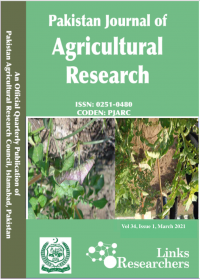Studies on the Yield, Quality and Biochemical Characters of Five Less Seeded Strains of Kinnow Mandarin
Studies on the Yield, Quality and Biochemical Characters of Five Less Seeded Strains of Kinnow Mandarin
Imran Muhammad Siddique1, Naseem Sharif1*, Abdul Ghaffar2, Mudassar Naseer1, Ammara Noreen3, Naseem Akhtar4 and Safeer ud Din5
ABSTRACT
In the entire scenario of Pakistan citrus sector, kinnow (Citrus reticulata Blanco) right from its introduction and successful acclimatization continues to dominate both in area and production besides an exportable commodity. Presence of large seed number in Kinnow is big issue for fresh consumption and as well as for processing industry in the international markets. Visualizing such compulsions of international markets, a systematic study was undertaken by Horticultural Research Station, Sahiwal with identification of five less seeded kinnow strains (1-6 seeds). Results depicted that less seeded kinnow strain, encoded LSKS-2, produced superior external and internal quality attributes. Average fruit weight and size outstripped other contestant strains. It produces average weight per fruit as 170.58gms with length/breadth, as 70.68mm and 68.08 mm respectively. Maximum juice recovery as 46.22% with glucose 48.08gms per liter, fructose 27.72gms per liter was obtained significantly high in less seeded strain LSKS-2. Total soluble solids as 11.70% remained in the same strain (LSKS-2). Vitamin C was18.43 mg/100gms besides total phenolic compounds 94.78 μgms in LSKS-2. However, somewhat tenacious fruit with more peel thickness was observed in LSKS-4 which was 3.31 mm. Highest firmness remained 2.48kg in LSKS-1 of less seeded kinnow. Conclusively less seeded strain LSKS-2 proved best of all the five strains of less seeded kinnow. The study is worthwhile for exploiting natural mutant kinnow strains bearing less seeded fruit of high quality characters through vegetative method of propagation thereby avoiding inevitable heterozygosity and polyembyonic nature of citrus fruits.
To share on other social networks, click on any share button. What are these?






